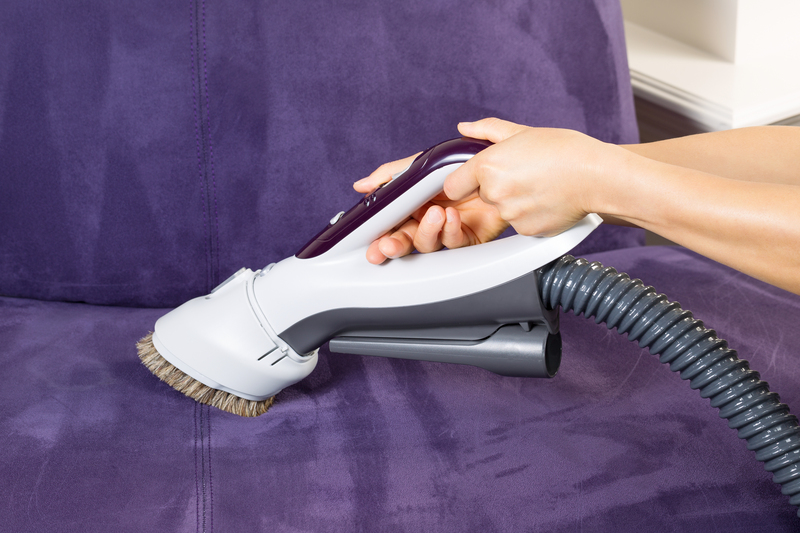Effortlessly Clear Pet Odors from Your Home Environment
Posted on 01/10/2025
Effortlessly Clear Pet Odors from Your Home Environment
Are you constantly battling lingering pet smells? Don't worry! Clearing pet odors from your home environment can be both simple and effective. With the right techniques, maintaining a fresh, inviting atmosphere becomes effortless, even with furry friends around. In this comprehensive guide, we unpack everything you need to know about eliminating, managing, and preventing pet odors - for good!
Understanding Why Pet Odors Occur
Before diving into solutions, it's essential to understand the sources of odors. Common culprits include:
- Pet urine and feces accidents
- Pet hair and dander build-up
- Body oils and saliva from your animals
- Unwashed bedding and toys
- Dirty litter boxes or cages
By identifying the root of the problem, you can target the most effective solutions for clearing pet odors quickly.

General Principles to Effortlessly Clear Pet Smells at Home
Maximize cleanliness, ventilation, and maintenance:
- Clean regularly: Keeping floors, fabrics, and surfaces spotless is key to preventing odor build-up.
- Aim for good airflow: Fresh air dilutes and removes pet smells more quickly.
- Use safe and effective cleaning agents: Target not just visible mess but also bacteria and odor-causing particles.
- Address accidents immediately: The quicker you act, the easier it is to keep pet odors from setting in.
Best Practices for Effortlessly Eliminating Pet Odors at Home
1. Regular Cleaning & Maintenance
- Vacuum Everywhere:
Use a high-quality vacuum with a HEPA filter to capture pet hair, dander, and debris from carpets, rugs, furniture, and floors. For best results, vacuum at least twice weekly - or daily if you're dealing with shedding pets. - Launder Pet Bedding Frequently:
Pet beds, blankets, and soft toys gather body oils and odors. Wash them weekly in hot water with a scent-free, pet-safe detergent to prevent unpleasant aromas from accumulating. - Mop and Wipe Surfaces:
Hard floors and surfaces can also harbor odors. Use a disinfectant approved for pet areas to mop up residues. Pay special attention to corners, skirting boards, and underneath furniture.
2. Addressing Accidents and Stubborn Spots
- Act Fast on Accidents:
Pet urine, feces, or vomit left on carpets or floors will produce persistent and hard-to-remove smells.- Blot - don't rub - to soak up as much liquid as possible.
- Use an enzymatic cleaner specifically formulated for pet messes. These products contain enzymes that break down odor molecules at the source.
- Allow the cleaner to sit for the recommended period before blotting dry.
-
Treating Old or Set-In Odors:
For persistent odors in carpets or upholstery, try:- Sprinkling baking soda liberally over the affected area. Let it sit overnight to absorb odors, then vacuum thoroughly.
- If needed, steam clean fabrics using a pet-safe cleaning solution or hire a professional carpet cleaner specializing in pet odors.
3. Deep-Cleaning for a Pet-Odor-Free Household
-
Regularly Wash Walls and Baseboards:
Pet body oils, saliva, and dander can linger on vertical surfaces. Wipe down washable paint or surfaces with a damp, soapy cloth every few weeks. -
Refresh Upholstery and Curtains:
Fabrics absorb pet smells. If possible, machine-wash removable covers and curtains monthly. Otherwise, consider using a fabric-safe odor eliminator spray. -
Maintain Air Purity:
An air purifier with a HEPA and activated carbon filter can trap airborne pet allergens and neutralize lingering odors.
Natural Solutions to Neutralize Pet Odors
For those seeking chemical-free alternatives, the following natural methods are proven to help with effortlessly clearing pet scents from your home:
- Baking Soda: An all-purpose odor absorber. Sprinkle it over carpets, rugs, and upholstery before vacuuming.
- White Vinegar: Dilute vinegar with water (50/50) in a spray bottle. Lightly mist and wipe down odor-prone areas (test on an inconspicuous spot first to avoid discoloration).
- Activated Charcoal: Place charcoal sachets in odor-heavy rooms or closets to passively absorb bad smells.
- Houseplants: Certain plants (like spider plants, bamboo palm, and peace lilies) purify air and help reduce overall indoor odors.
- Sunlight: Regularly air out pet bedding and rugs outdoors in sunlight, which acts as a natural deodorizer.
Advanced Tips: Preventing Pet Odors Before They Start
The best way to clear pet odors effortlessly is to stop them before they settle:
- Groom Your Pets Frequently:
- Brush fur every day to limit shedding and dander.
- Bathe pets regularly with a mild shampoo designed for their species.
- Wipe paws and bellies after outdoor walks to avoid tracking in outside smells.
- Keep Pet Areas Hygienic:
- Scoop litter boxes daily and wash them out weekly with hot soapy water.
- Clean cages, tanks, and animal pens as per species-specific guidelines.
- Replace old, smelly toys and chews or wash them as appropriate.
- Establish House Rules: Consider restricting pets from certain rooms (like bedrooms) to limit the spread of odors, especially where cleaning is less frequent.
- Invest in Slipcovers or Washable Rugs: These protect upholstery and floors, making clean-up a breeze.
Pet Odor Removal for Specific Areas of the Home
Clearing Pet Odors from Carpets and Rugs
- Blot and treat pet accidents quickly with an enzymatic cleaner.
- Apply baking soda overnight and vacuum thoroughly to neutralize lingering scents.
- Consider periodic professional steam cleaning (twice a year) if your pet spends a lot of time indoors.
Deodorizing Hard Floors
- Sweep and mop regularly, focusing on corners and beneath furniture.
- Add a splash of white vinegar to your mop water for deeper odor elimination.
Refreshing Upholstery and Curtains
- Vacuum all soft surfaces.
- Machine-wash slipcovers and curtains when possible.
- Use a spray-on fabric deodorizer that's pet-safe, or lightly mist vinegar solution for a natural approach.
Litter Box and Cage Odor Solutions
- Choose high-quality, odor-absorbing litter and scoop daily.
- Wash litter boxes, cages, and accessories thoroughly every week.
- Place air purifiers or activated charcoal near pet zones to minimize overall smell in the area.
Odor Removal from Air and HVAC Systems
- Replace HVAC filters every 2-3 months, especially if you have pets.
- Don't overlook vents, which can accumulate dander and dust - have ducts professionally cleaned if odors persist.
- Use standalone HEPA air purifiers in key areas like living rooms and pet rooms.
Choosing the Right Pet Odor Removal Products
With so many options on the market, it's vital to pick solutions that are both effective and safe for your pets and family:
- Enzymatic Cleaners: Break down urine, feces, and vomit at the molecular level, eliminating stains and odors for good.
- Natural Absorbents: Baking soda, activated charcoal, and zeolite minerals all draw odors out of the environment naturally.
- Pet-Safe Air Fresheners: Opt for fragrance-free or nature-derived formulas to avoid irritating your pet's sensitive nose or skin.
- High-Efficiency Air Purifiers: Look for models designed for allergy and pet odor removal (HEPA plus carbon filter).
Pro Tip: Avoid using harsh chemicals or products containing ammonia, which can smell similar to pet urine and encourage repeat accidents.
Troubleshooting: When Pet Odors Won't Go Away
- Check for Hidden Sources: Sometimes, the smell lingers due to hidden accidents (under furniture or in closets) or old messes in little-used rooms.
- Examine HVAC and Airflow: Stale air can trap scents. Increase ventilation, replace filters, and consider professional duct cleaning.
- Seek Professional Help: For deep, old, or mysterious smells, a professional odor removal service can identify and fix issues quickly.
Creating a Long-Term Odor-Free Home: Maintenance Schedules
- Daily: Scoop litter boxes, inspect for accidents, ventilate rooms, and groom your pet.
- Weekly: Wash bedding, vacuum, mop, and clean all pet zones. Launder soft toys and slipcovers.
- Monthly: Steam clean carpets or have them professionally cleaned. Wash walls, curtains, and baseboards.
- Every Few Months: Change HVAC filters and deodorize lesser-used rooms.
Consistency is key. Adopting these routines will help you effortlessly clear pet odors from your home environment and enjoy long-lasting freshness.

Frequently Asked Questions About Pet Odor Removal
Can I use essential oils to mask pet odors?
While some essential oils may help with odor, many are toxic to cats, dogs, and birds. Always ensure any air freshener or cleaning product is pet-safe and used in moderation.
How can I stop repeat accidents in the same spot?
Use enzymatic cleaners to fully eliminate the odor; pets often return to spots that still smell like urine or feces. Use a pet deterrent spray if needed and block access while the area recovers.
Are store-bought odor removers better than DIY solutions?
Many DIY products, such as baking soda and vinegar, are highly effective for general deodorizing. However, for stubborn or old messes, enzymatic cleaners are generally more effective.
Conclusion: Enjoy a Fresh, Odor-Free Home with Pets
With the right approach, maintaining a fresh, clean, and odor-free home environment--even with pets--is entirely achievable. Frequent cleaning, immediate attention to accidents, preventive strategies, and selecting the right odor-removal products are your best allies. By following these comprehensive tips, you can effortlessly clear pet odors from your home--and love living with your furry companions, minus the smell!
- Start small: Focus on high-traffic and pet-favorite zones first.
- Keep supplies handy: Store cleaning products, deodorizers, and grooming tools in accessible places.
- Involve everyone: Make pet odor control a household routine for lasting results.
Ready for a home that's inviting, healthy, and beautifully fresh--no matter how many pets you have? Implement these expert-backed tips today, and reclaim an odor-free space you and your furry friends will love!




